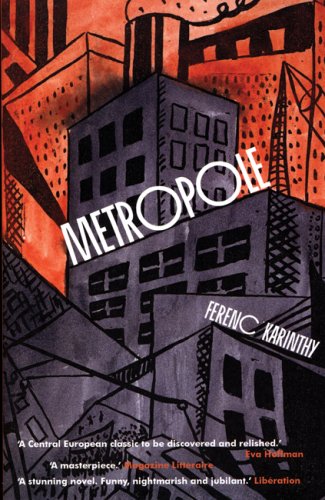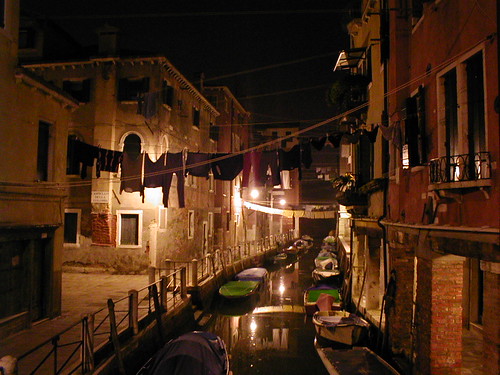Metropole, by Ferenc Karinthy, was published in Hungarian in 1970.* This translation, by George Szirtes, was published last year. The blurb on the back from G.O. Châteaureynaud says
With time, Metropole will find its due place in the twentieth-century library, on the same shelf as The Trial and 1984.
which gives you an idea of the general literary area we’re in. It’s the story of Budai, a linguist who gets on the wrong plane and finds himself in a strange city. He gradually realises he is trapped there, not because some person or organisation is holding him against his will, but because despite speaking most major European languages, he cannot make himself understood or decipher any of the language around him.
Which is a nightmarish situation and the book did in fact give me nightmares. Well, not really; I couldn’t sleep properly because of my hay-fever†, and I was drifting in and out of sleep having peculiar Metropole-related dreams about being unable to read a piece of text. Can’t remember what it was.

The scenario — a man trapped in a mysterious world he doesn’t understand — makes Kafka the obvious comparison, but I’d be reluctant to reach too quickly for the word ‘Kafkaesque’ because that to me implies a certain very specific tone and atmosphere. It’s a long time since I read Kafka, but I remember it being much more relentlessly surreal. Metropole is played comparatively straight: it’s set in a very peculiar world but it has an internal consistency to it, and the story is told in a straightforward way.
In that sense I can see the comparison with Orwell, and the sprawling, grey, joyless city is certainly somewhat like the London of 1984, but otherwise I don’t think it quite works. The world of 1984 has to be a real place. A fictional real place, but still real; it’s a vision of the future. It’s not at all clear that the world of Metropole is real in the same way. It’s more like Budai has accidentally wandered into the wrong novel; nothing makes sense to him because him even being there means that something is fundamentally broken.
The other analogy that occurred to me is that it’s like a story from one of those Oliver Sacks books: someone is in a car accident or has a stroke, and they wake up completely unable to process language. The rest of their brain seems to be working fine, but somehow the ability to understand language has gone missing and all they hear is gibberish.
I have to admit that the book didn’t completely grab me, but I suspect that’s more to do with me being in the wrong mood than a problem with the book itself. I can see that it’s inventive and atmospheric and darkly funny, and if I didn’t get completely absorbed by it, well, perhaps I read too much of it while feeling like my head had been stuck in a bucket full of hairy caterpillars.
* OK, one procedural point here: when reading a book in translation, I don’t think it should be difficult to find out when the book was first published in its original language. It should be somewhere on the title page. I shouldn’t need to look up the author on Wikipedia. I suppose it could be strategy: perhaps the people at Telegram Books think I’m less likely to read it if I realise that it is *gasp* 40 years old. Probably not. But it’s annoying either way. The potential confusion is increased by the fact that the only copyright dates listed on the title page prior to the English translation are 1999 and 2005 in France. I would guess there’s some kind of added complication arising from the fact that it was originally published in communist Hungary? I dunno.
† I mean seriously, my eyes were really sore and I couldn’t breathe properly. Thankfully the worst of my hay-fever seems to fairly short-lived; there’s about a week or two when it’s rough enough that it can be quite distressing, then it calms down a bit. I don’t know whether it’s because there’s less of the relevant kind of pollen or because my immune system stops panicking as much.
